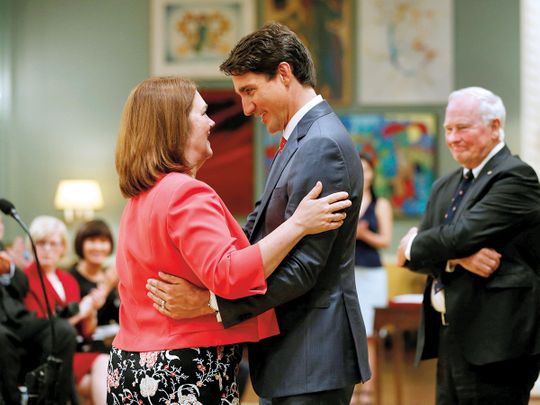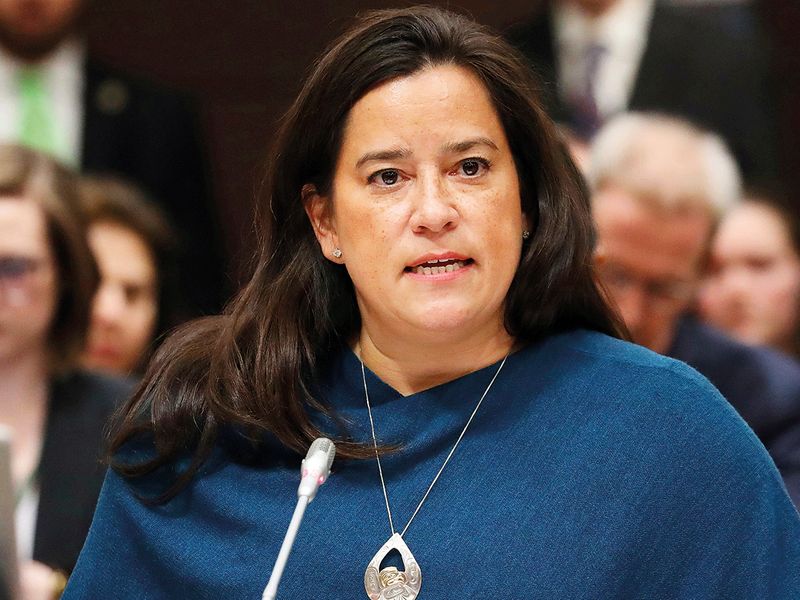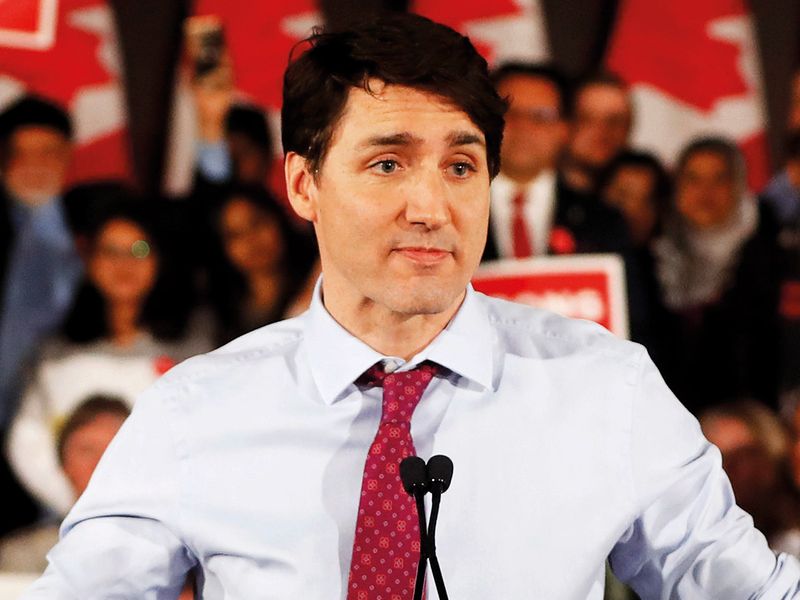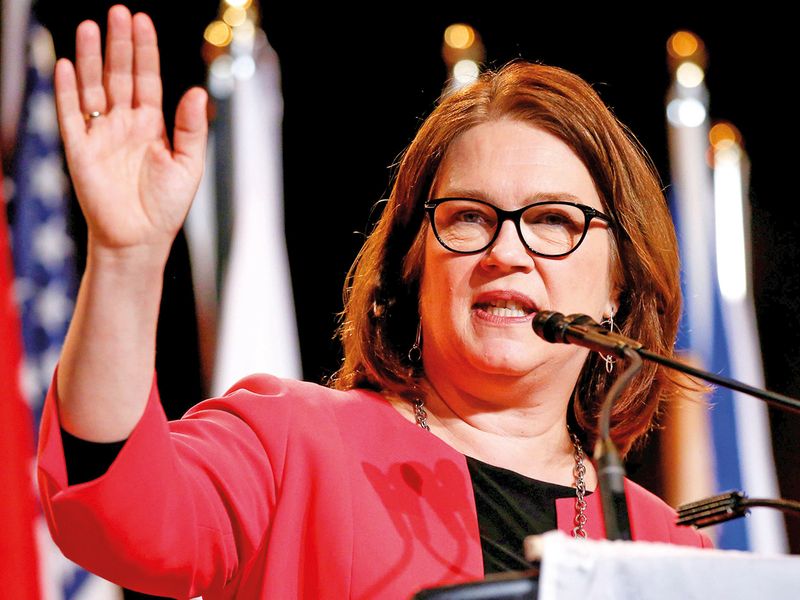
Ottawa, Ontario: Another minister in the Cabinet of Prime Minister Justin Trudeau of Canada quit in protest on Monday over accusations that he and his aides tried to influence a criminal case against a multinational Canadian company accused of bribing the Libyan government.
The unexpected resignation, by Jane Philpott, who led the treasury board, inflames a growing political crisis that has already cost Trudeau his former justice minister and his top aide.
“I’ve been considering the events that have shaken the government in recent weeks and after serious reflection, I have concluded that I must resign as a member of Cabinet,” said Philpott, who was also a former health minister and minister of indigenous affairs.
SNC-Lavalin has openly lobbied to be allowed to enter into a remediation agreement instead of going to trial.
Speaking to a Liberal party rally in Toronto on Monday night, Trudeau thanked Philpott for her service.
“I know that Ms Philpott has felt this way for some time,” Trudeau said during a speech, which was occasionally interrupted by hecklers. “While I’m disappointed, I understand her decision.”
Trudeau said that the political controversy “has generated important discussion” and added that “there are more questions to be answered and more to be said in the coming days and weeks.”
With a federal election looming seven months away, Trudeau must now not only salvage his reputation as someone who promised an open approach to politics, but may be in peril of losing control of his position as leader of the Liberal Party, which would end his time as prime minister.
On Monday, Andrew Scheer, the Conservative leader, repeated his call for Trudeau to step down and called on other Cabinet ministers to follow Philpott’s example.
In announcing her decision, Philpott cited accusations that Trudeau and his aides had exerted improper and excessive pressure on the justice minister and attorney general at the time, Jody Wilson-Raybould, to seek a settlement in the criminal case against the company, SNC-Lavalin.
A criminal conviction would have barred the company from bidding on government contracts for a decade, potentially leading to major job losses in Quebec, where it has its headquarters.
Wilson-Raybould resisted the pressure, and quit the Cabinet last month. Philpott was among the few Cabinet ministers to publicly side with her.
“There can be a cost to acting on one’s principles, but there is a bigger cost to abandoning them,” Philpott wrote in her resignation letter to Trudeau on Monday.
Former attorneygeneral and justice minister Jody Wilson-Raybould resigned suddenly from Cabinet in February. Also in February, Trudeau’s top aide, Gerald Butts, announced he would quit.
Privately, several members of his caucus have said Trudeau has badly fumbled his handling of the controversy. Publicly, though, they have spoken in solidarity with the prime minister.
Royce Koop, a political scientist at the University of Manitoba in Winnipeg, said that might now change.
“Philpott was really the talent pool of the Trudeau Cabinet, she got things done,” he said. “The question now is do we now start to see the beginning of a caucus rebellion? I haven’t heard that anything is happening. But this is going to shift opinion in the caucus.”
But Koop said he’s seen nothing to suggest that Wilson-Raybould was trying to lead a movement to eject Trudeau as the party leader and, thus, prime minister.
Both Wilson-Raybould and Philpott, who was a doctor before entering politics in 2015, were recruited by Trudeau to enter politics in the 2015 election. Neither has developed a strong political machine to support their new careers.
Both former ministers worked closely together on some of Trudeau’s signature achievements, including the legalisation of medical marijuana and, before that, right-to-die legislation. Both say they intend to remain in the Liberal caucus.
Trudeau’s troubles began nearly a month ago when The Globe and Mail, citing anonymous sources, said Trudeau and his aides had improperly pressured Wilson-Raybould to use a newly created law to work out a settlement for SNC-Lavalin that would have seen it pay a substantial fine to avoid a criminal conviction.
Canadian authorities have accused the company of paying 47.7 million Canadian dollars (Dh131.6 million) in bribes to officials in Libya to win contracts there, and defrauding the Libyan government and its agencies of 129.8 million Canadian dollars.
In January, Wilson-Raybould was moved by Trudeau from justice minister and attorney general to veterans affairs minister, which many saw as a demotion and a slight to the one remaining indigenous member of the Cabinet. On February 12, she resigned.
Last week in testimony before the House of Commons’ justice committee, Wilson-Raybould described 10 meetings, 10 conversations and a series of email exchanges in which Trudeau, his senior aides and others, in her view, improperly pressured her to cut a deal with the company.
She testified that while no one broke the law, they crossed informal lines in Canada that are supposed to isolate prosecutors from politics by mentioning the potential political consequences for the Liberals of shutting SNC-Lavalin out of government business.
Trudeau has said he disagrees with Wilson-Raybould’s characterisations of events. Several senior Liberals have said that many others share his view.
Gerald Butts, a close friend of Trudeau’s who quit as his top political aide after the initial news articles about the accusations, is set to testify before a parliamentary committee Wednesday.
Ken Coates, a political historian at the University of Saskatchewan in Saskatoon, said Philpott’s resignation was the most significant act of Cabinet revolt in about 50 years.
“To have a minister not directly involved in all this stand up and resign — it’s astounding,” Coates said. “We’re now in a new world.”
EXPLAINER: What is the SNC-Lavalin affair?
Canadian Prime Minister Justin Trudeau has been accused of pressuring his former attorney general to cut a deal with Quebec-based SNC-Lavalin — one of the world’s largest engineering and construction companies which is now facing corruption charges — and retaliating when she refused to play ball.
THE PLAYERS
The spurned ex-minister

Jody Wilson-Raybould was the attorney general and justice minister of Canada — where the two roles are held by the same person. She was also Canada’s first indigenous justice minister and worked on a number of pieces of landmark legislation, including legalising cannabis and assisted death. In January, she was shuffled from the justice department to the department of veterans’ affairs — a move many saw as a demotion.
The corporation

SNC-Lavalin is one of the world’s largest engineering and construction companies. It faces fraud and corruption charges in relation to approximately C$48 million in bribes it is alleged to have offered to Libyan officials between 2001 and 2011, when Muammar Gaddafi was in power. The company has openly lobbied to be allowed to enter into a remediation agreement instead of going to trial, saying it has cleaned house and changed its ways. The matter is proceeding to trial and the company says it will “vigorously defend itself” against the allegations.
The prime minister

Justin Trudeau is Canada’s prime minister. He won a majority government in 2015 on a platform of transparency, gender equality and a commitment to reconciliation with Canada’s indigenous peoples. He faces a federal election in October 2019.
The allies who quit

Jane Philpott is described as one of Trudeau’s most trusted ministers. But her resignation statement explaining why she was quitting as Treasury Board president could not have been more pointed. Citing the SNC-Lavallin affair, she said: “I must abide by my core values, my ethical responsibilities, constitutional obligations. There can be a cost to acting on one’s principles, but there is a bigger cost to abandoning them.”
Former attorney general and justice minister Jody Wilson-Raybould resigned suddenly from Cabinet in February. Also in February, Trudeau’s top aide, Gerald Butts, announced he would quit, denying in a statement that he or anyone on his staff had done anything wrong but saying he had to leave so as not to be a distraction from the team’s “vital work”.








